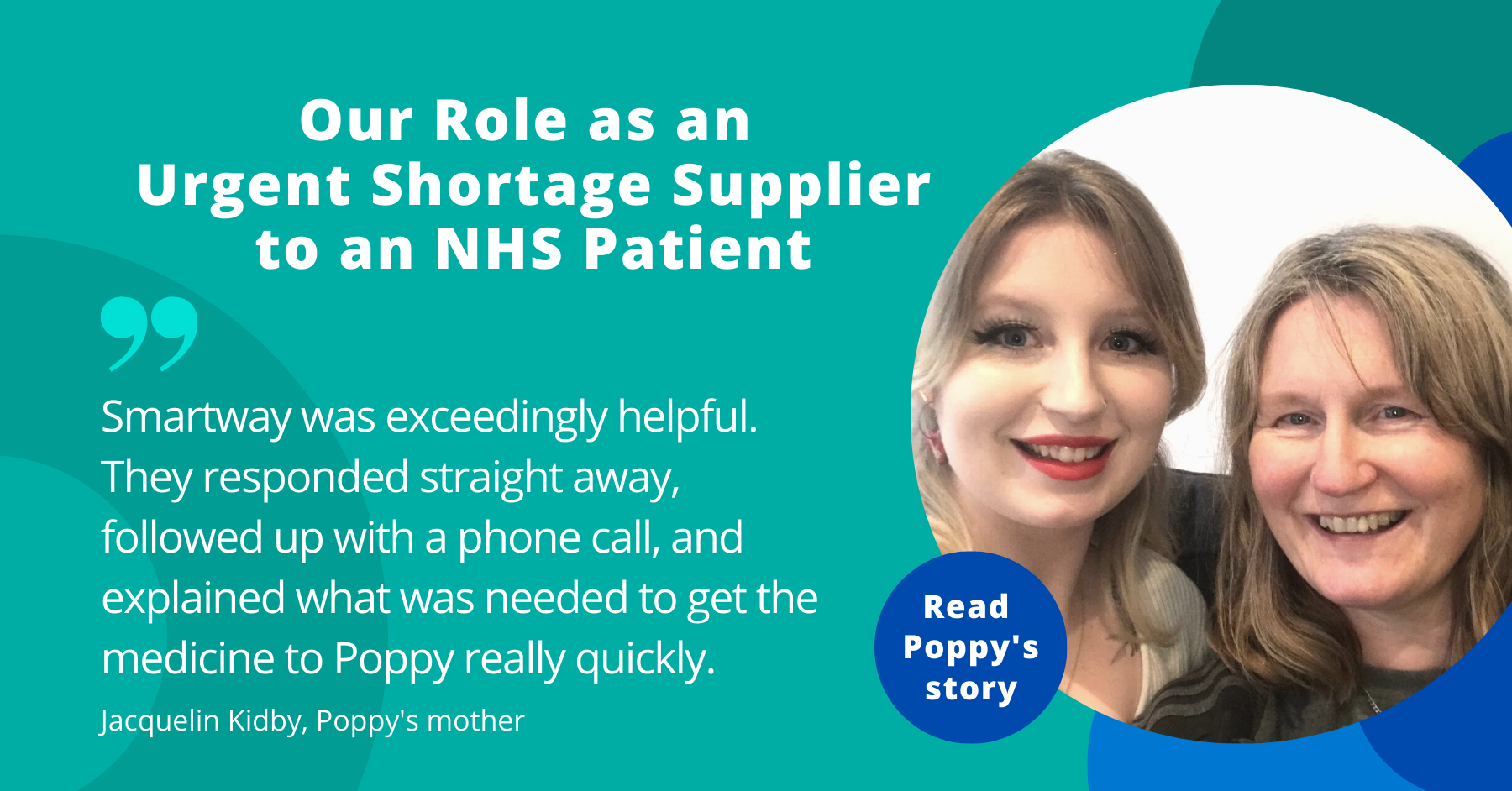When shortages of medicines occur, there is a direct impact on the welfare of those patients who are without access. Shortages of medicines happen on a global level - the causes of a shortage in India, can cause a shortage in the UK. Numerous incidents of shortages have been reported in the media in recent times.
Every hospital, clinic, surgery or pharmacy must now have clear plans on how to mitigate the risk of medicine shortages. There are good reasons for doing this, says Dhruv Patel:
At the heart of every medicine shortage is a patient who cannot obtain the therapy the physician has decided is best for them.
Dhruv Patel, Chief Operating Officer
But why do shortages happen and how does Smartway work with manufacturers, hospitals and pharmacies to ensure continued patient access to medicines that are the same as their current therapy but are imported in as an unlicensed medicine?
Why medicine shortages occur
Most medicine shortages become apparent at the hospital or community pharmacy level, typically within the NHS. The Pharmaceutical Services Negotiating Committee (PSNC), the representative trade group for NHS community pharmacies in the UK has laid out a useful structure as to why this happens.
Manufacturing issues
Manufacturing medicines is a global endeavor carried out in pharmaceutical manufacturing sites across the globe. These sites take years to configure for the manufacture of a particular medicine and require approval for each medicine manufactured in this site. The sites are not always interchangeable and production is not easy to switch from site to site; as was demonstrated clearly in the CoVid-19 pandemic when the production of vaccines took time to be established at global sites. If there is any disruption at these sites from either physical interruptions caused by natural disasters, labour disputes, capacity or quality issues, then the impact upon production can cause a shortage. The availability of raw ingredients including active pharmaceutical ingredient (API) also obviously impact the production capability. API production is a very specialised operation and is often located at a differing production facility site.
Supply and distribution challenges
Due to the global nature of the manufacture of pharmaceuticals, any disruption to global supply chains and delays at airports and ports impact medicine supply significantly. The movement of medicines across international borders is not free of risk, especially for those medicines that require special refrigerating throughout their journey. These are commonly referred to as ‘unlicensed medicines’, which is where they are registered in one country but not another. These alternatives are predominately used to fulfil shortages in any given territory.
Market issues
There are several market issues that may impact consistent supply including the commercial withdrawal of a therapy from an individual country as it is not being used to a level which would support its manufacture and registration within that country, however some patients may be relying on that particular therapy. Misguided intervention in the market pricing or large variations in price for medicine often has unintended consequences of a reduction of supply of the therapy which in turn leads to an unwanted medicine shortage.
Regulatory or government intervention
If a Government or regulator form the view that there is likely to be a shortage of medicines in a country, they may decide to restrict the export of those medicines. This can have a corresponding impact on other countries, who rely on the source country for manufacturing or supply. Likewise, the same issue can happen if a regulator decides to suspend a manufacturer or wholesaler who supplies those medicines because of quality issues or other suspected breaches of pharmaceutical, drug and medicines law.
Drug recalls and quality issues
Medicine production and distribution is rightly a highly regulated sector. Any quality issue detected at any point in the manufacture or supply chain can result in the suspension of activity at that site and subsequent loss of production capacity or the withdrawal of a particular batch from the market. With specialist drugs, a batch that is recalled may reflect the usage for a number of countries for a year.
Unexpected peaks in demand
Given the long production cycle of medicine manufacture demand is forecast over a long period. Should the actual demand be higher than forecast due to unexpected national demand say for a pandemic or highly prevalent infection, then supply will not be enough. This can be exacerbated by stock piling or by supply quotas.
Any change in demand of the manufacturer or supply chain cannot quickly be rectified due to the complex processes and high regulatory demands of medicines production. This means that shortages will often occur for short periods of time with little notice.
How Smartway manage these risks both proactively and reactively
Smartway is committed to providing safe and effective unlicensed medicines at an affordable price on a consistent basis. We have an global procurement distribution network which is designed to be resilient to the issues that cause shortages. This resilience allow us to deliver medicines safely and promptly, when and where medicine is needed the most. Where needed, we setup special processes and arrangements for customers, manufacturers, biotech companies, and suppliers.
What we do:
- We work in partnership with pharmaceutical manufacturers, biotech companies, medical affairs, and supply chain functions. They proactively use Smartway to ensure patients do not go without access to their therapies. It combined with our capacity to obtain and manage Real World Data/Evidence (RWD/RWE), manufacturers and biotech companies are able to make informed decisions.
- Shortage intelligence - we use a wide range of reliable sources around the globe to manage shortages, and help us plan ahead before they even occur. This advanced insight allows us to take action to reduce the risk of patients unable to access medicines and ensure continuity of supply with unlicensed medicine alternatives suitable for their continued therapy.
- We manage medical shortage issues by ensuring that our suppliers are aware of changes in demand or supply. If there is an increase or decrease in demand for a particular unlicensed medicine, this will be communicated to our suppliers as soon as possible so they can adjust their production schedules. Just as importantly, if there is a reduction in supply, this is communicated immediately so that our suppliers can adjust their production schedules accordingly.
- We have experience working across both large pharmaceutical companies and small independent pharmacies. We know how to identify potential issues so you can avoid them before they even occur.
This approach protects patients and it enhances the reputation of those manufacturers and biotech companies.
But does it work and can we help you?
Yes, it works. Our team can advise on the best way to solve your problem and ensure that you get back up and running as soon as possible. At Smartway, our team is prepared to manage medicine shortage issues in advance and reactively. We are a leading supplier of unlicensed medicines for the healthcare sector and have been supplying products to NHS hospitals and pharmacies for decades. You can read about an example when we have been contacted by an NHS patient in a need of an urgent contraceptive medicine which was in shortage throughout the UK. You can learn how we reacted to this enquiry and ensured she and other patients got the medicine she urgently needed. Poppy’s story is just one of many shortages we have responded to.
Because of our relationship with our suppliers and manufacturers, we can react quickly to changes in demand and we are able to continually source new unlicensed products worldwide. This allows us to manage supply issues that may arise, by ensuring a reliable supply chain. Our primary aim has remained the same since 1942, which is to continue with our patient-centric approach and transform lives by empowering access to medicines globally.
Sign up for our emails to receive regular updates on medicine shortages. Thanks to our global reach and exceptional regulatory expertise, we can supply the medicine you need, whenever and wherever you need it.







